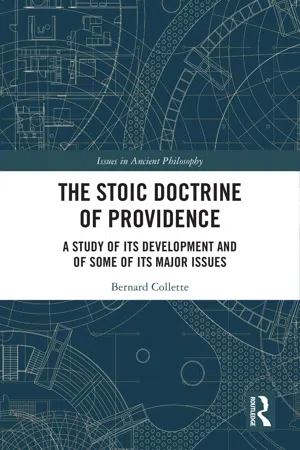
The Stoic Doctrine of Providence
A Study of its Development and of Some of its Major Issues
- 424 pages
- English
- ePUB (mobile friendly)
- Available on iOS & Android
The Stoic Doctrine of Providence
A Study of its Development and of Some of its Major Issues
About This Book
The Stoic Doctrine of Providence attempts to reconstruct the Stoic doctrine of providence (as argued for in ancient texts now lost) and explain its many fascinating philosophical issues.
Examining issues such as the compatibility between good and evil, and how a provident god can serve as model of political leadership, this is the first monograph of its kind to focus on the question of Stoic providence. It offers an in-depth study of the meaning and importance of this topic in eight distinct generations of Stoics, from Zeno of Citium (fourth century B.C.) to Panaetius of Rhodes (second century B.C.) to Marcus Aurelius (second century A.D.).
The Stoic Doctrine of Providence is key reading for anyone interested in Ancient Stoicism or the study of divine providence in a philosophical setting.
Frequently asked questions
1 Zeno on providence
1 Providence as one of god’s names
T1-1 Zeno the Stoic, in his On Nature (ἐν τῷ Περὶ φύσεως), calls ‘fate’ (εἱμαρμένην) the motive power of matter (δύναμιν κινητικὴν τῆς ὕλης), which <moves it> in the same unchanging way (κατὰ ταὐτὰ καὶ ὡσαύτως), <and says> that it is not different from (μὴ διαφέρειν) providence and nature (πρόνοιαν καὶ φύσιν).
2 Providence and nature
2.1 Nature as a craftsmanlike fire
T1-2 Now Zeno gives this definition of nature: ‘nature is a craftsmanlike fire (ignem… artificiosum), proceeding methodically towards generation (ad gignendum progredientem uia)’. For he holds that the special function of an art or craft is to create and generate (creare et gignere), and that what in the processes of our arts is done by the hand is done with far more skillful craftsmanship (multo artificiosius) by nature, that is, as I said, by that ‘craftsmanlike’ fire which is the teacher of the other arts (magistrum artium reliquarum). And on this theory, every nature is ‘craftsmanlike,’ in the sense of having, as it were, a method or path to follow (quod habet uiam quandam et sectam quam sequatur).
T1-3 Zeno says that the sun and the moon and each of the other stars are intelligent and thoughtful (νοερὸν καὶ φρόνιμον) and have the fieriness of craftsmanlike fire (πυρὸς τεχνικοῦ). For there are two kinds of fire: one is not craftsmanlike (ἄτεχνον) and converts its food into itself (μεταβάλλον εἰς ἑαυτὸ τὴν τροφήν); the other is craftsmanlike (τεχνικόν), responsible for growth and preservation (αὐξητικόν τε καὶ τηρητικόν), as is the case in plants and animals where it is nature and soul respectively. Such is the fire which constitutes the substance of the stars.
Table of contents
- Cover
- Half Title
- Series Page
- Title Page
- Copyright Page
- Dedication
- Table of Contents
- List of abbreviations
- Acknowledgements
- Introduction
- 1 Zeno on providence
- 2 Cleanthes on providence
- 3 Chrysippus’ On Providence
- 4 Panaetius on providence
- 5 Posidonius and Cleomedes on providence
- 6 Seneca on providence
- 7 Epictetus on providence
- 8 Marcus Aurelius on providence
- 9 Providence and self-preservation
- 10 From cosmic oikeiôsis to personal providence
- Bibliography
- Glossary of Greek terms
- Glossary of Latin terms
- Index of sources
- General Index